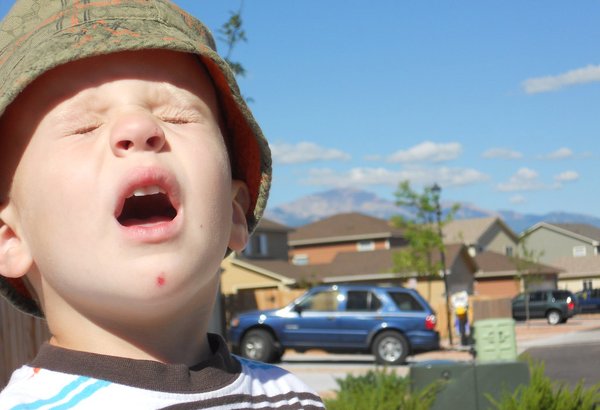Allergy season is upon us. Because of all the snow and rain we had last winter, the forecast is calling for a heavy pollen season April through May. In fact, we are going to experience some of the highest allergen exposure of the country this spring. Adults are not the only ones who will be feeling it; many children have seasonal allergies, too.
Hay fever, or allergic rhinitis, is the culprit for all the sneezing, stuffy/runny noses, watery eyes, fatigue, headaches and itching that many of us experience in the spring through fall. Those with seasonal hay fever have allergic sensitivity to tree, grass and weed pollen or to airborne mold spores. People with year-round, or perennial, hay fever are allergic to house dust mites, animal dander, cockroaches and/or mold spores.
- MORE ON ALLERGIES
- This is when spring allergy season is expected to hit
- As seasonal allergies return, more people finding relief under the tongue
- Climate change may be aggravating your seasonal allergies
Hay fever affects nearly 10 percent of children in America. Is your child one of them?
As with any concern about your child, your first call should be your pediatrician. The common cold and hay fever present very similar symptoms and only a doctor can determine the root cause of your little one’s discomfort. Your pediatrician may refer you to a pediatric allergist for further testing determine if your child has allergic rhinitis and diagnose his specific allergies.
If your child has hay fever, avoiding his specific allergen triggers is critical. Which sometimes can prove very difficult. Like, if you discover your little one is allergic to animal dander aka to the dog you’ve had for 10 years. Or your kid is allergic to grass pollen aka the freshly-mowed field where his baseball game is happening. Or your child is allergic to mold aka can’t jump around in the huge pile of leaves all the neighborhood kids are enjoying.
But there are steps you as a parent can take to help alleviate your children’s symptoms so they can focus on living carefree, happy lives.
ANIMAL DANDER
Keep your pet out of your child’s bedroom and try to minimize their interactions. Talk to your medical professional to determine if allergy immunotherapy (shots) could help.
HOME PESTS
Contact a professional exterminator to combat any pesky pests, like cockroaches, that could be agitating your child’s allergies. Store food in containers and always keep your kitchen clean.
DUST MITES
These critters hide in padded furnishings and upholstered furniture. Keep mattresses, box springs and pillows in allergen-proof covers and wash your linens and blankets once a week in hot water.
SPRING CLEANING
Dust and vacuum often to remove indoor allergens or outdoor allergens that have been tracked inside. Consider using a HEPA air purifier in bedrooms to keep the air clean.
OUTDOOR ALLERGENS
Keep your windows closed in your home and car, using air conditioners whenever possible. Give your kids a bath or shower every night to help remove allergens from their body and hair. Pets who go outside should be bathed frequently as they can track pollen and mold indoors. Kids with hay fever will be happiest playing outside after a strong rain, as it will wash away a lot of the pollen. And keep your sneezing little ones inside until 10 a.m., if possible; pollen counts are highest from 5 a.m. until mid-morning.
MEDICATIONS
Your child’s doctor may recommend medications to manage allergies. Antihistamines can alleviate itchy, watery eyes, runny noses, sneezing and hives. This type of medication is available both over-the-counter or by prescription but parents are cautioned to not give it to children under age 4. Another medication used to manage chronic allergy symptoms are nasal corticosteroids, a type of steroid that must be prescribed by your pediatrician. Allergy immunotherapy, or allergy shots, are prescribed for treatment of respiratory allergies to pollens, dust mites, cat and dog dander and molds and for whom allergen avoidance and medications do not work.
I suspect my son has seasonal allergies because he, like I, experience those tell-tale symptoms of sneezing, runny nose and itchy eyes in spring and fall. Luckily, his symptoms do not seem to bother him all that much, only last for a few weeks during the peak pollen seasons and do not require medication. When I notice his hay fever acting up, I turn to these homeopathic remedies. If you are interested in natural ways to soothe your little one’s hay fever, talk to your pediatrician about these options:
• Saline nose spray breaks up and thins mucus, helping your little one’s stuffy nose. Added benefits include minimizing coughing and snoring.
• Honey: If my son has a sore throat or a cough, I give him a teaspoon of honey rather than an OTC medication. It is incredibly effective! But do not give honey to babies under one; it could be life-threatening.
• Chamomile tea: My pediatrician recommends warm (not hot!) chamomile tea with milk and honey after dinner to help settle a little one who is not feeling well to sleep. But if your child has a ragweed allergy, do not give them chamomile.
Taking steps to prevent your little one’s hay fever from making them – and you – go haywire will keep everyone smiling this spring so you can get outside and enjoy this beautiful season.
What are your go-to remedies for hay fever? Share with me and other parents in the comments section, below, or tweet me at @ThePhillyVoice and @KathleenEGagnon.


